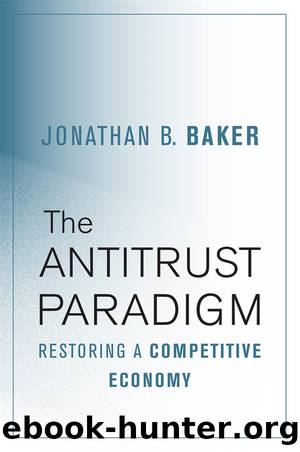The Antitrust Paradigm by Jonathan B. Baker

Author:Jonathan B. Baker
Language: eng
Format: epub
Publisher: Harvard University Press
Efficiencies and Cross-Market Welfare Trade-Offs
The argument about the role of market definition in antitrust cases involving platforms is in part a dispute over whether courts should allow harms to some platform users to be offset by benefits to users on other platform sides. Should a shopping platform, for example, be allowed to justify anticompetitive conduct that depresses the prices paid to suppliers by showing that the same conduct led the platform to compete more aggressively in selling products to shoppers, so shoppers paid less?
When the standard approach to market definition is employed, the products or services on different sides of platforms are typically not included in the same market. If in addition, only within-market efficiencies count, harm to the users on one side of a platform cannot be defended by showing benefits to users on another side. A prohibition on cross-market balancing does not foreclose a platform defendant from relying on feedback effects to attack the plaintiff’s case, however. The defendant can still show that it would have no incentive to harm competition on the platform side where harm is alleged once the consequences of feedback with other sides are taken into account.47
When the defendant’s argument about effects across platform sides turns on offsetting efficiencies across markets rather than on the unprofitability of the alleged conduct, though, the defendant cannot prevail unless a court is willing to undertake cross-market welfare trade-offs when evaluating the reasonableness of firm conduct. Even when the defendant also argues that feedback effects would make the alleged conduct unprofitable, the defendant may wish to put the courtroom focus on benefits to end users on the other side of the platform by framing its case in terms of offsetting efficiencies. Accordingly, cases in which the plaintiff alleges harm to end users on one side of a platform may raise the issue of whether antitrust law should incorporate cross-market welfare trade-offs when evaluating whether conduct harms competition.
Consistent with the case law involving harms to suppliers, antitrust law does not permit courts to offset competitive harms in one market with competitive benefits in another. Consider the Supreme Court’s Philadelphia National Bank decision.48 In that 1963 case the Court concluded that the merger of two large Philadelphia banks harmed competition in commercial banking in the Philadelphia area. The Court declined to consider the merging firms’ proposal that the transaction be allowed because the merger would enhance competition in a different market, a national market for loans to large firms. As a matter of prosecutorial discretion in merger review, the antitrust enforcement agencies may permit benefits in one market to offset harms in another when the two are inextricably linked,49 but under Philadelphia National Bank, which still controls, courts cannot follow suit.50 The same rule applies in non-merger litigation.51 Courts may look to both benefits and costs within the same market when evaluating the reasonableness of challenged conduct, but they may not count benefits in one market against harms in another.52
The main argument for overruling Philadelphia National Bank on this issue,
Download
This site does not store any files on its server. We only index and link to content provided by other sites. Please contact the content providers to delete copyright contents if any and email us, we'll remove relevant links or contents immediately.
The Secret History by Donna Tartt(16605)
The Social Justice Warrior Handbook by Lisa De Pasquale(11484)
Thirteen Reasons Why by Jay Asher(7776)
This Is How You Lose Her by Junot Diaz(5746)
Weapons of Math Destruction by Cathy O'Neil(5026)
Zero to One by Peter Thiel(4814)
The Myth of the Strong Leader by Archie Brown(4782)
Promise Me, Dad by Joe Biden(4438)
Stone's Rules by Roger Stone(4408)
Beartown by Fredrik Backman(4398)
How Democracies Die by Steven Levitsky & Daniel Ziblatt(4390)
The Fire Next Time by James Baldwin(4336)
100 Deadly Skills by Clint Emerson(4069)
A Higher Loyalty: Truth, Lies, and Leadership by James Comey(4023)
Rise and Kill First by Ronen Bergman(4006)
The David Icke Guide to the Global Conspiracy (and how to end it) by David Icke(3874)
The Farm by Tom Rob Smith(3866)
Secrecy World by Jake Bernstein(3772)
The Doomsday Machine by Daniel Ellsberg(3725)
